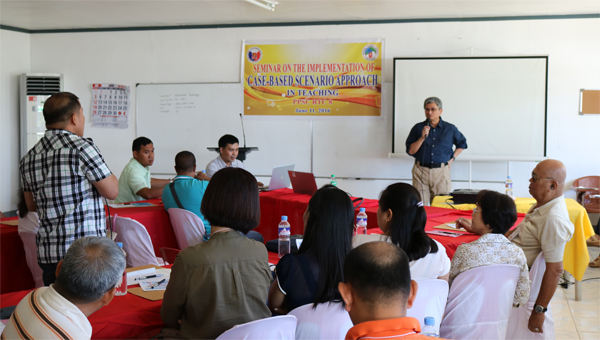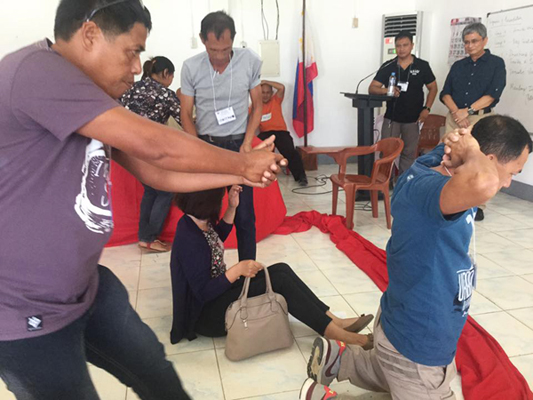Philippine Public Safety College (PPSC) Regional Training Center
PPSC-RTC promotes the use of practical, case-based teaching methods for police officer training for police instructors in the Eastern Visayas Region

HSF
The activity is the second for the year, and the fourth under the partnership between the PPSC and the Hanns Seidel Foundation (HSF). PPSC tapped its own resources and committed to promote the use of the basic (patrol, investigation & traffic) training scenarios through RTC-specific training activities. Training materials were forwarded to RTCs and seminars on the use of these materials have been conducted at the National Capital Region Training Center (NCRTC) in Taguig City, the Regional Training Center No. 12 (Southern Mindanao) in General Santos City, the Regional Training Center No. 10 (Northern Mindanao) in Cagayan de Oro City, and this latest activity at the Regional Training Center No. 08 (Eastern Visayas) in Tacloban City.
The seminar demonstrated the linkage between the theoretical subjects, the conduct of practical training, and how a training scenario could capture several subjects such as legal principles, police operational procedures, communication, self-defense, and the proportionate use of force. The resource persons incorporated training principles emphasized by the BPA, that responding (to police situations) police officers should always: be knowledgeable of police operational procedures and the legal basis of their actions; have the necessary practical skills obtained from repeated training exercises; and be able to effectively communicate their actions as a means to inform and de-escalate conflict between the police officers and the persons being accosted. Part of the seminar included a discussion on the partnership between the PPSC and the HSF to promote practical, case-based method of police training, and how police recruit training is conducted at the BPA. A highlight of the seminar was having the participants act out training scenarios then evaluating how they acted out the roles.

HSF
Participants’ feedback and conduct during the group exercises were positive, with the participants noting how practical training may be incorporated in the subjects they teach. Some of the participants’ comments were as follows: “..the case-based scenario approach opened our minds to a new horizon in teaching..;” “..it helped instructors to teach the students to be more effective and accurate in dealing with incidents that will be encountered by police officers specially the police recruits..;” and “..it was the kind of seminar that went out of the traditional lecture method and immediate application of knowledge was performed by the participants..”
Resource persons/instructors were Police Superintendent and NCRTC Training Director Mariano, Police Superintendent and Central Luzon Training Director Nestor Babagay, and NCRTC Chief of Academics Ms. Rowena Gimpes. Together with police training officials from the PPSC and the Philippine National Police, all three were able to visit and observe police recruit training at the Bavarian Police Academy (BPA) in Eichstätt, Bavaria.
The PPSC, through the National Police Training Institute (NPTI) and its RTCs provides direction, administration and control of the mandatory training for all police recruits. Every year, the PPSC accepts 6,000 to 10,000 recruits to join the police force. The recruits undergo a twelve-month police recruit training program inclusive of a six-month basic training at the RTCs and a five-month field training assignment in police stations. The PPSC promotes the use of case-based training within the one-year basic training period to strengthen the police officers’ analytical and problem-solving skills.
With the initial focus on basic police recruit training, the PPSC developed more than 30 case-based training scenarios, each designed with the corresponding list of expected training outcomes and evaluation system. These scenarios were organized into the basic police training modules, namely, patrol, traffic, and investigation. Eventually, the PPSC will develop additional case materials as these relate to police precinct/station administration, operations and management, or more complex police situations for use in senior-level training courses.
The Hanns Seidel Foundation’s (HSF) collaboration with the PPSC first started from 1997 through 2004, and was then renewed in 2013 to develop and promote the use of practical case-based training for police officers. Since 2013, the partnership between HSF and the PPSC arranged for information visits of PPSC training directors, professors, and training managers to observe police training and interact with their counterparts from the BPA; conduct of local seminars by visiting instructors from the BPA for core faculty and police instructors to develop case material and effectively share these with their colleagues in the field for the latter to integrate in their respective training curricula and programs of instruction; and further assistance in the development of case-based scenarios for police officer training.
